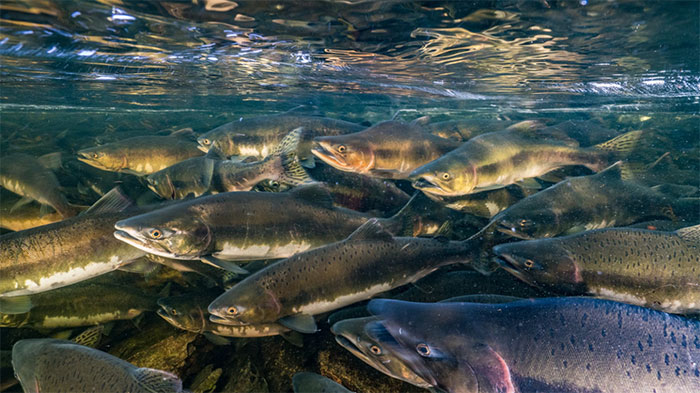Migratory freshwater fish populations have declined by more than 80% since 1970
Recent research shows that migratory freshwater fish populations have decreased by more than 80% since 1970.
According to the study, migratory freshwater fish populations are declining in all regions of the globe, with the sharpest decline in South America and the Caribbean, where a decline of 91% has been recorded over the past 50 years. This is the area with the largest freshwater fish migration density in the world, but the construction of dams, mining and water diversion are destroying the river ecosystem. According to the Living Planet Index (LPI), in Europe, migratory freshwater fish populations have decreased by 75%.

Migratory freshwater fish populations have decreased by more than 80% since 1970. (Illustration: nationalgeographic.com).
Meanwhile, the International Union for Conservation of Nature (IUCN) released a report showing that 25% of freshwater fish species are threatened with extinction , with migratory fish species facing a greater threat. The above data does not take into account changes in Africa, but researchers believe that many species in this region are facing stressors.
Migratory freshwater fish are partly or completely dependent on freshwater systems, some are born in the sea and migrate back to freshwater or vice versa. They have become part of the daily menu and livelihood of millions of people around the globe. However, many rivers no longer have their natural flow due to the construction of dams and other barriers that prevent fish migration. In addition, there are other causes such as pollution from urban wastewater, industrial wastewater and surface runoff from roads and agricultural activities. Climate change is also altering habitats and affecting freshwater systems. Unsustainable fishing practices are another threat.
Founder of the World Fish Migration Foundation (WFMF), one of the organizations participating in the study, expert Herman Wanningen said that the catastrophic decline of migratory fish populations is a wake-up call for the world and communities. It is time to call for global action now to save these species and the rivers they inhabit. The study's authors also called on the world to restore and protect rivers, removing barriers to the migratory habits of fish species. Researchers are also promoting the search for alternative renewable energy solutions for thousands of new hydroelectric dam projects being planned for construction around the world. Last year, a record 487 barriers in 15 European countries were removed.
Dr Anthony Acou of the French National Institute for Research on Agriculture, Food and the Environment (INRAE) said that because many fish species that migrate between salt and freshwater spend most of their lives in the sea, it is important that The impacts on both marine and freshwater habitats must be better understood in order to have effective management measures.
- The world's rivers and lakes have lost nearly 90% of large species
- Summary of popular freshwater fish species in Vietnam you should know
- Things you do not know about marine fish statues
- Horror with 'freshwater monsters' riverbed
- Sea fish are descendants of river fish?
- Freshwater fish bears the name of President Obama
- Detected 112-year-old freshwater fish in the US
- Detecting pirate fish 'equipped' chemical weapons
- Payara's scary weapon - one of the world's most dangerous freshwater fishes
- Close-up of the species
- Mekong River fish ranked
- Discovered 12 new freshwater fish species
 Animal 'suffering' after hibernation
Animal 'suffering' after hibernation Why do goats climb well?
Why do goats climb well? Scientists were surprised to see chimpanzees eating turtles
Scientists were surprised to see chimpanzees eating turtles Giant catfish died deadly due to drought in Thailand
Giant catfish died deadly due to drought in Thailand